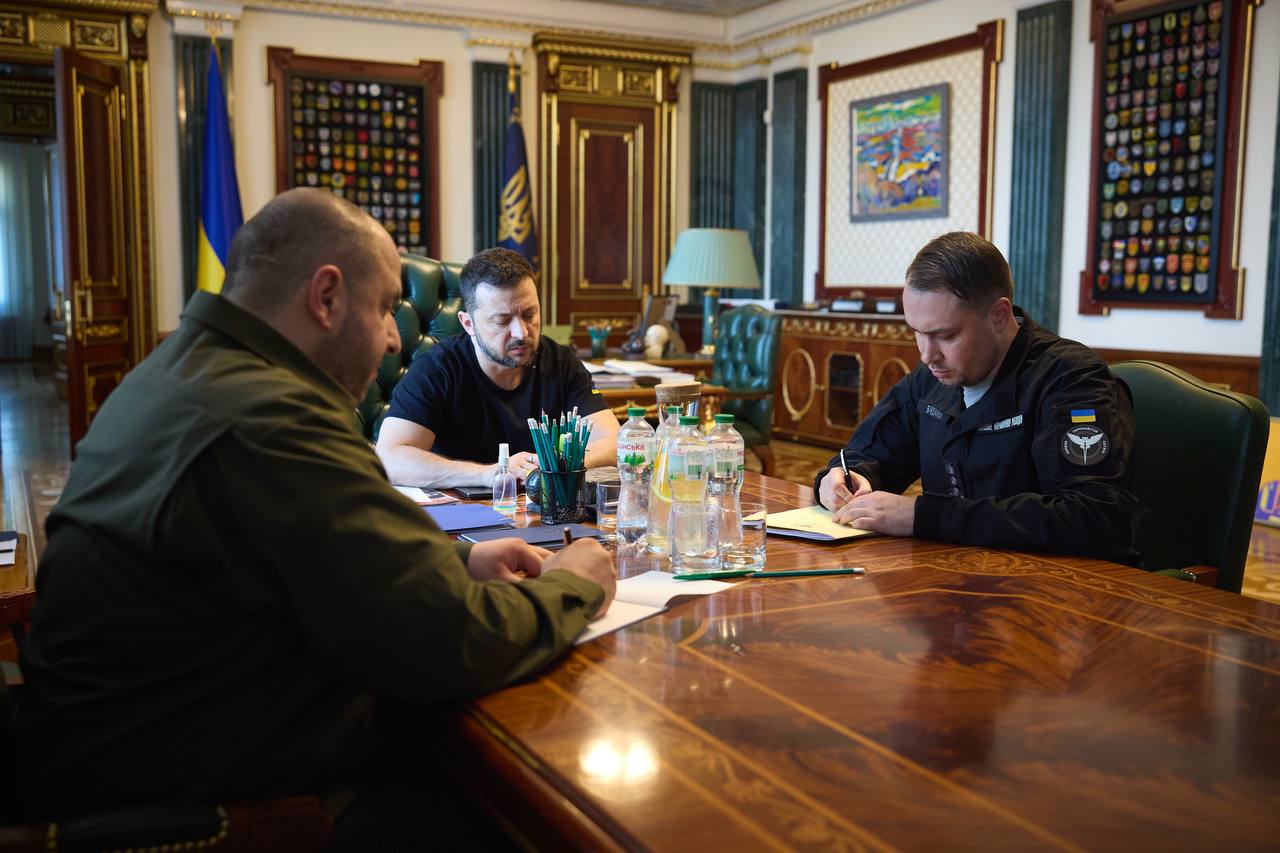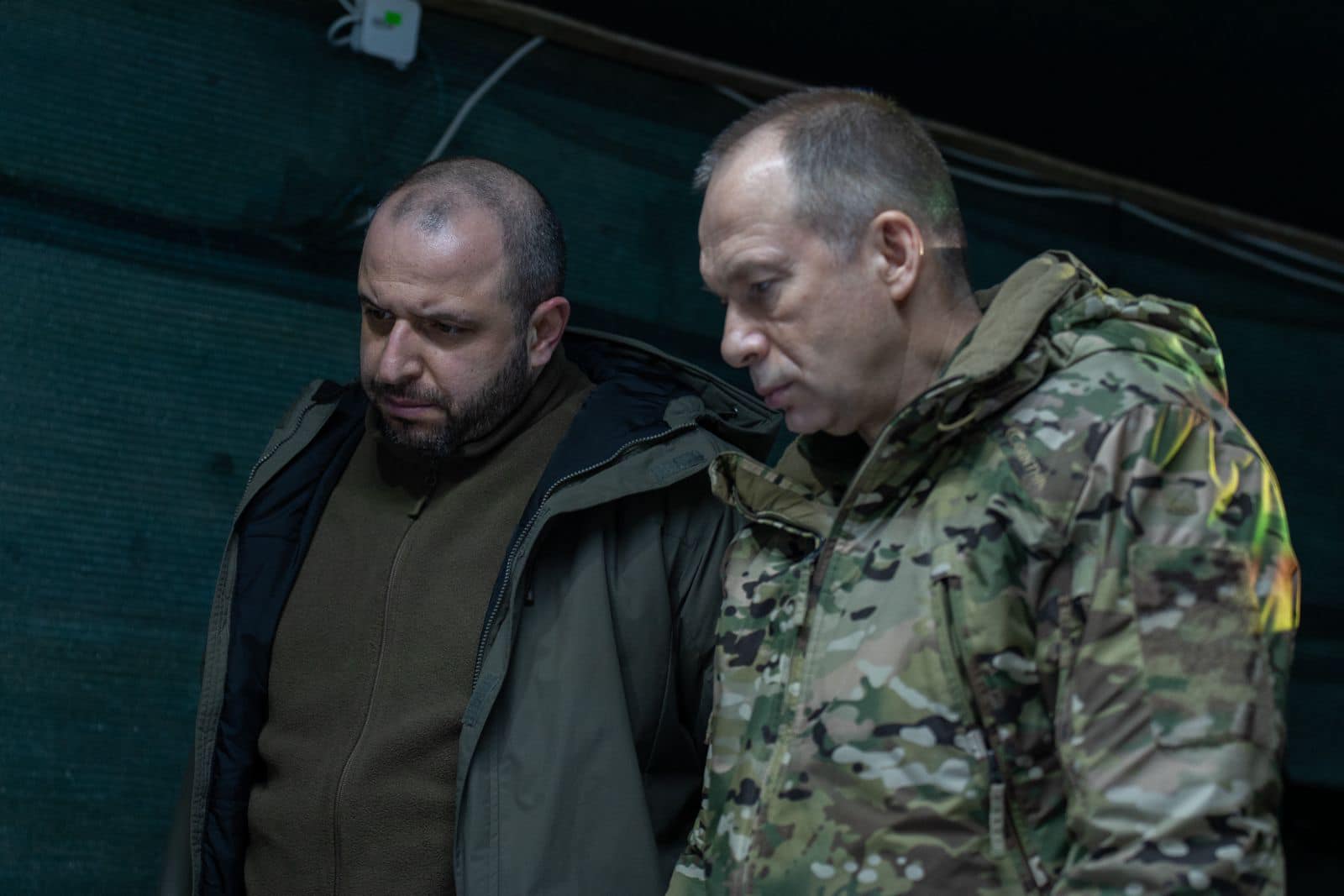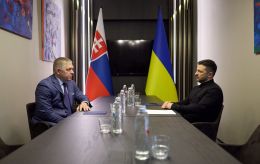Budanov, Umerov and Syrskyi: Why there is talk of dismissal of key military staff in Ukraine
 The topic of reshuffling the military leadership has been postponed for now, but not completely closed (photo: Ministry of Defense on X)
The topic of reshuffling the military leadership has been postponed for now, but not completely closed (photo: Ministry of Defense on X)
Why the resignations of Budanov, Umerov, and Syrskyi were discussed and whether these talks are over, read in RBC-Ukraine's article.
Contents
In the second half of September, alleged announcements of upcoming changes in the military leadership appeared in the information space - first on social media, and then in the media. According to the versions that circulated in the media week after week, the head of the Defense Intelligence of Ukraine, Kyrylo Budanov, the Minister of Defense, Rustem Umerov, and even the Commander-in-Chief of the Armed Forces of Ukraine, Oleksandr Syrskyi, could be dismissed.
It seems that this topic has now somewhat faded into the background. However, as eight interlocutors from various military and political circles told RBC-Ukraine on condition of anonymity, rumors of these dismissals and changes did not come out of nowhere.
Is there a possibility of replacing Budanov?
Early last week, the Presidential Office published a photo from Volodymyr Zelenskyy's office during his meeting with the Defense Minister and the Chief of the Defense Intelligence of Ukraine. The Presidential Office reported that they discussed the plans of Russian troops at the front. This joint photo was probably supposed to dispel rumors and show that everyone continues to work in their jobs.
However, according to several RBC-Ukraine sources, talks about Kyrylo Budanov's possible replacement appeared for a reason. According to them, the chief of the Defense Intelligence of Ukraine intelligence has a conflict with the head of the Presidential Administration, Andriy Yermak, who is one of the supporters of his dismissal.
The next wave of tension between Budanov and the Office began to build this summer. According to RBC-Ukraine, first, they wanted to remove more than a dozen military attachés and combat special forces from the DIU's subordination. Now, according to the agency, they are talking about a certain reorganization of the military attaché apparatus, as a result of which the intelligence service should not lose its influence on this institution.
 Last week, the President met with the Minister of Defense and the Chief of the Defense Intelligence of Ukraine (photo: Presidential Office)
Last week, the President met with the Minister of Defense and the Chief of the Defense Intelligence of Ukraine (photo: Presidential Office)
Another public event was an attempt to expand the negotiating team that prepares exchanges on behalf of the Coordinating Headquarters for the Treatment of Prisoners of War (CHTPW).
Budanov has been heading the Coordination Center since mid-2022. De jure, it is a body of the Cabinet of Ministers, which should include representatives of various structures. De facto, the CHTPW 's activities were carried out mainly under the auspices of the DIU. In mid-August, there were attempts to include representatives of the Security Service of Ukraine, the Ministry of Internal Affairs, the Armed Forces, the Armed Forces of Ukraine, and the Verkhovna Rada Commissioner for Human Rights in the negotiating group at the Coordination Headquarters. In addition, they tried to create a kind of council or presidium at the headquarters, which would include representatives of the bodies that are already members of the Coordination Center.
From the outside, all these moves looked like an attempt to displace DIU or at least reduce its influence in the issue of exchanges. However, according to the RBC-Ukraine's sources in the Ukrainian Defense Forces, the role or activities of the DIU have not changed since then.
“While some were speculating what happened to the Coordination Headquarters, privately, the DIU was being removed from the list of those who could carry out long-range strikes on Russian territory. How are such operations planned? The coordinates, goals, and objectives are determined, and then the executor is chosen. That is, it was proposed that all other agencies, except for DIU, would be able to carry out such operations, but it did not come to that,” one of the interlocutors told RBC-Ukraine.
Another story that could have cast a shadow over the DIU was the events surrounding Spetstechnoexport (STE). Since October, this state-owned enterprise has been withdrawn from the Defense Intelligence of Ukraine and placed directly under the control of the Ministry of Defense. Since the beginning of Russia's full-scale invasion of Ukraine, STE has been importing foreign weapons, equipment, and ammunition for the Ukrainian Defense Forces, including from countries that do not openly and directly cooperate with Ukraine.
The Defense Ministry explained the reorganization by saying that it had encountered obstacles during the internal audit of STE. At the same time, the company had problems with its receivables, which were reported in the media. Due to many factors, the company could not deliver certain contracted weapons on time and, therefore, accumulated debts to the Ministry of Defense. In the future, the Ministry plans to inspect Spetstechnoexport's activities and possibly liquidate it.
However, other interlocutors in the military-political leadership claim that the STE story is not related to tensions with Budanov and only coincided in time. “It was not sudden, it took months for the decision to transfer the STE directly to the Defense Ministry,” one of the sources added.
At the same time, several informed interlocutors of RBC-Ukraine claim that Budanov has made enemies in other agencies, including the Security Service of Ukraine. However, according to their own words, the head of the DIU has quite normal and constructive relations with the head of the special service, Vasyl Maliuk.
The media also talked about Budanov's conflict with Commander-in-Chief Syrskyi, which is why the chief of DIU was allegedly not involved in the operation in the Kursk region. However, the RBC-Ukraine's sources deny both the first and the second.
“There is, so to speak, a healthy competition between the General Staff and the DIU based on intelligence. It happens that the DIU brings its information, and the General Staff brings its own, which it receives from the Armed Forces units on the battlefield. Sometimes, their data and the forecasts made based on this data do not coincide. And it happens that it does not coincide in favor of the General Staff. However, there is no conflict as such,” explains one of the informed interlocutors.
Now, according to several unrelated sources, the clouds over the DIU chief have cleared. However, none of them can predict for how long.
“The President is being convinced that Budanov will allegedly go on a separate political voyage. Although they have normal relations with Zelenskyy himself. Budanov has direct communication with him and direct communication with foreign partners, which is not to everyone's liking. The Office of the President sees him as recognizable, as are his media activity and trust ratings. However, Budanov's recognition and ratings are now playing in his defense. The Office of the President is afraid of what his dismissal without any obvious complaints about his work could turn into,” one of the sources said. In the end, these reasons were repeated with different wording by four more interlocutors of RBC-Ukraine.
Some of them believe that attempts to shake Budanov's chair will continue, and his resignation issue will likely be revisited before the end of this year. In addition, according to the RBC-Ukraine, the Office of the President has been eyeing a candidate who could take the place of the DIU chief if he is replaced: the current head of the Foreign Intelligence Service, Oleh Ivashchenko, who, according to the RBC-Ukraine, has good relations with Syrskyi and Deputy Head of the Office of the President Roman Mashovets. Budanov himself, according to one version, may be offered a position like deputy chief of intelligence: on the one hand, to keep him in the orbit. On the other hand, to deprive him of real leverage and media exposure.
Can Umerov and Syrskyi be replaced?
Along with the talk about Budanov's future, social media gossiped that Defense Minister Rustem Umerov was also supposedly going to be dismissed. About two weeks before, there was information, confirmed by RBC-Ukraine's sources, that almost all of the Minister's deputies might be replaced shortly. In the end, Umerov dismissed only 3 of his deputies and the state secretary but remained in office.
According to the RBC-Ukraine's interlocutors, there is no threat of the Minister's resignation now. 3 of them explained that there were no significant complaints about Umerov's work, and there was no one to replace him.
 Neither Umerov nor Syrskyi is facing resignation soon (photo: Facebook of Rustem Umerov)
Neither Umerov nor Syrskyi is facing resignation soon (photo: Facebook of Rustem Umerov)
“Probably, the Presidential Office's key complaint may be that after a year in office, Umerov has not fully met the expectations that the Presidential Office had for him. Although he has no conflicts with either the President or Yermak. And there are no candidates to replace him either,” says one of the sources.
At the level of discussions, the Office considered the candidacies of Deputy Prime Minister and Minister of Digital Transformation Mykhailo Fedorov and First Deputy Defense Minister Ivan Havryliuk. However, sources close to the Deputy Prime Minister claim he is not ready to move to another position, as he has many tasks in his current position. According to the RBC-Ukraine, there have been no discussions with Havryliuk about changing his position.
As for Oleksandr Syrskyi, the peak of tension around him has already subsided. In early summer, the President's Office did indeed think about a possible replacement for the Commander-in-Chief, who had been in office for less than six months at the time. One of those considered for Syrskyi's position was Valerii Zaluzhnyi's former deputy, Lieutenant General Yevhen Moisiuk. In February, the President appointed him as his commissioner for the implementation of international security guarantees and the development of the Ukrainian Defense Forces.
The reason is very similar to that of Umerov. “It is the general stagnation at the front, the situation in the East. After Zaluzhnyi was replaced, the Presidential Office hoped for a different, fresh, and breakthrough approach. Another thing is whether it is possible in the current situation, conditions, and circumstances. However, after the start of the Kursk operation, this idea disappeared, and Syrskyi is doing fine,” said one of the sources.
Another source confirmed that with the Kursk operation, the Commander-in-Chief did regain his former favor with the Presidential Office. Therefore, there is currently no question of replacing him.
At the same time, one of RBC-Ukraine's sources suggested that if the Presidential Office does decide to dismiss Budanov, they will probably try to do it in a package with other personnel to blur the resonance. This may be the reason for gossip about other military and political leadership changes.

